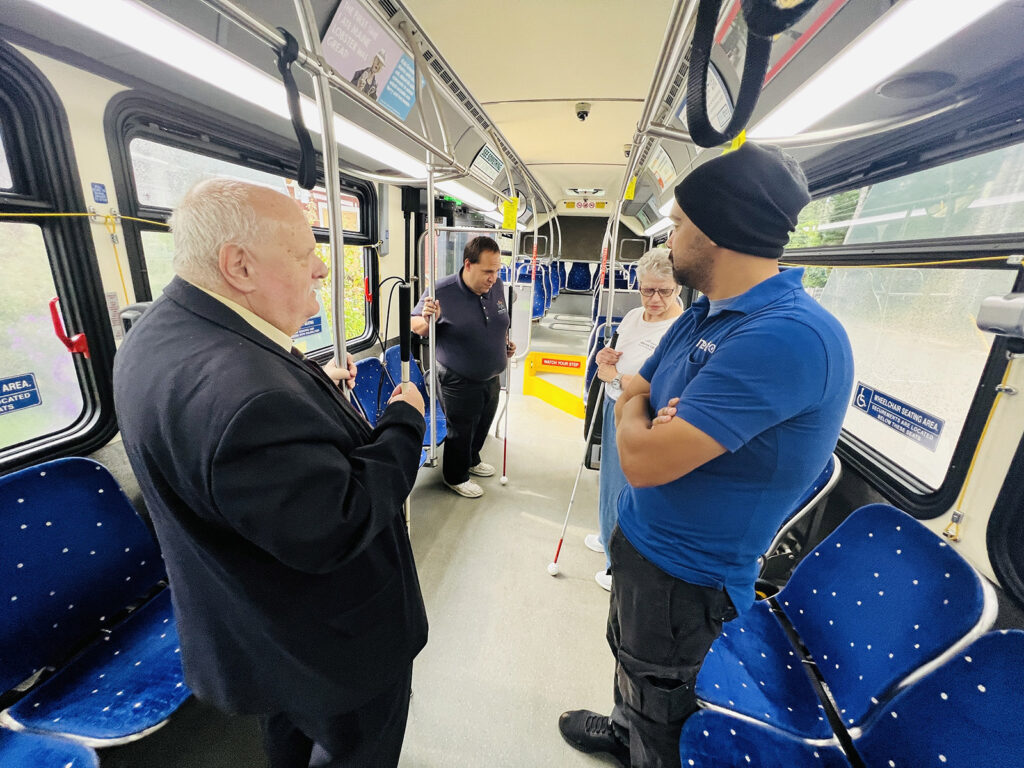Reasonable Accommodation Requests
Metro staff works with representatives from the Iris Network, State of Maine Division for the Blind & Visually Impaired and others to provide accessible materials and improve our service.
Several accommodations are available for riders who are blind or visually impaired.
Additional suggestions are welcomed by emailing Metro staff.

Schedule Information
Metro schedules for all routes are posted on the website and can be enlarged on computer screens.
Large Format Schedules
Service Animals
Riders with disabilities accompanied by a service animal are welcome on Metro buses. The service animal is the responsibility of the rider and must be under control at all times. Metro reserves the right to refuse passage to a service animal that poses a direct threat to the health and safety of others.
Additional Reasonable Modification Requests
Metro will consider requests for reasonable modifications to policies and procedures with disabilities. Email Metro with your request and please include your contact information and the type of request.
Reasonable Modification Policy and Procedures
Purpose
Ensure that Metro’s public transportation services are provided in as accessible a manner as possible
to persons with disabilities and comply with applicable federal regulations (49 CFR Parts 27 and 37 –
Transportation for Individuals with Disabilities; Reasonable Modification of Policies and Practices).
Policy
Metro will provide reasonable accommodations to policies, practices, or procedures when the
accommodations are necessary to avoid discrimination on the basis of disability unless making the
modifications (1) would fundamentally alter the nature of the service, program, or activity, or (2) would
result in undue financial and administrative burdens, or (3) without the requested modification, the
individual with a disability is able to fully use the entity’s services, programs, or activities for their
intended purpose.
Procedures
- Metro will ensure information about this policy and process is readily available to the public,
including individuals with disabilities. At a minimum, Metro will post this policy on its website,
and will conduct outreach to appropriate groups and organizations. Materials will
note that this policy can be made available in accessible formats. - Persons with disabilities who would like to make a reasonable accommodation request are asked to
complete the Reasonable Modification Form and submit to Metro’s Transit Manager.
Metro asks the following of individuals making a request:
a. Make request in advance of desired change in policy or practice;
b. Please be as specific as possible about how a current policy or practice creates a barrier to
your use of Metro’s public transit system;
c. Please recommend the reasonable modification you would like Metro to consider.
Metro will make every effort accommodate immediate reasonable accommodation requests for
situations in which a potential immediate and present barrier to using public transit. In these
situations, passengers are asked to contact Metro at 207-774-0351. - Within three (3) business days, Metro’s Transit Manager will review the request and make a
determination as to whether Metro can grant the request. He/she will specify the exact nature of
the accommodation on the Reasonable Modification Form. Within five (5) business days, the
determination and action will be communicated to the requestor along with all appropriate
personnel including dispatchers, bus operators, customer service staff and the Chief Transportation
Officer.
114 Valley Street | Portland, ME 04102
info@gpmetro.org | 207-774-0351 - Passengers are advised that Metro may deny reasonable accommodation requests on the following
grounds:
a. The request would result in a fundamental alteration of the Metro’s services.
b. Fulfilling the request would create a direct threat to the health and safety of others, including (but not limited to) Metro personnel, other passengers or the general public.
c. The requested modification would not be necessary to permit the passenger to use Metro’s services for their intended purpose in a nondiscriminatory fashion.

